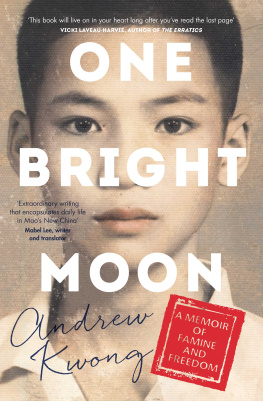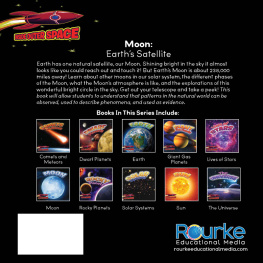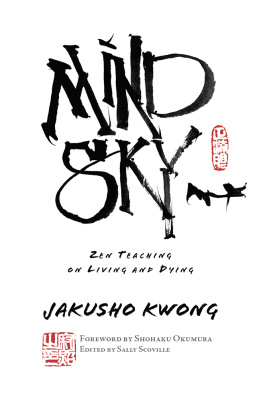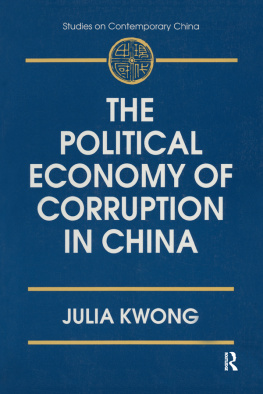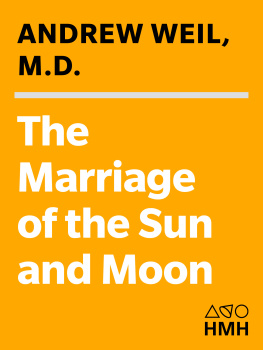Andrew Kwong - One Bright Moon
Here you can read online Andrew Kwong - One Bright Moon full text of the book (entire story) in english for free. Download pdf and epub, get meaning, cover and reviews about this ebook. year: 2020, publisher: HarperCollins, genre: Non-fiction. Description of the work, (preface) as well as reviews are available. Best literature library LitArk.com created for fans of good reading and offers a wide selection of genres:
Romance novel
Science fiction
Adventure
Detective
Science
History
Home and family
Prose
Art
Politics
Computer
Non-fiction
Religion
Business
Children
Humor
Choose a favorite category and find really read worthwhile books. Enjoy immersion in the world of imagination, feel the emotions of the characters or learn something new for yourself, make an fascinating discovery.
- Book:One Bright Moon
- Author:
- Publisher:HarperCollins
- Genre:
- Year:2020
- Rating:3 / 5
- Favourites:Add to favourites
- Your mark:
- 60
- 1
- 2
- 3
- 4
- 5
One Bright Moon: summary, description and annotation
We offer to read an annotation, description, summary or preface (depends on what the author of the book "One Bright Moon" wrote himself). If you haven't found the necessary information about the book — write in the comments, we will try to find it.
One Bright Moon — read online for free the complete book (whole text) full work
Below is the text of the book, divided by pages. System saving the place of the last page read, allows you to conveniently read the book "One Bright Moon" online for free, without having to search again every time where you left off. Put a bookmark, and you can go to the page where you finished reading at any time.
Font size:
Interval:
Bookmark:
CONTENTS
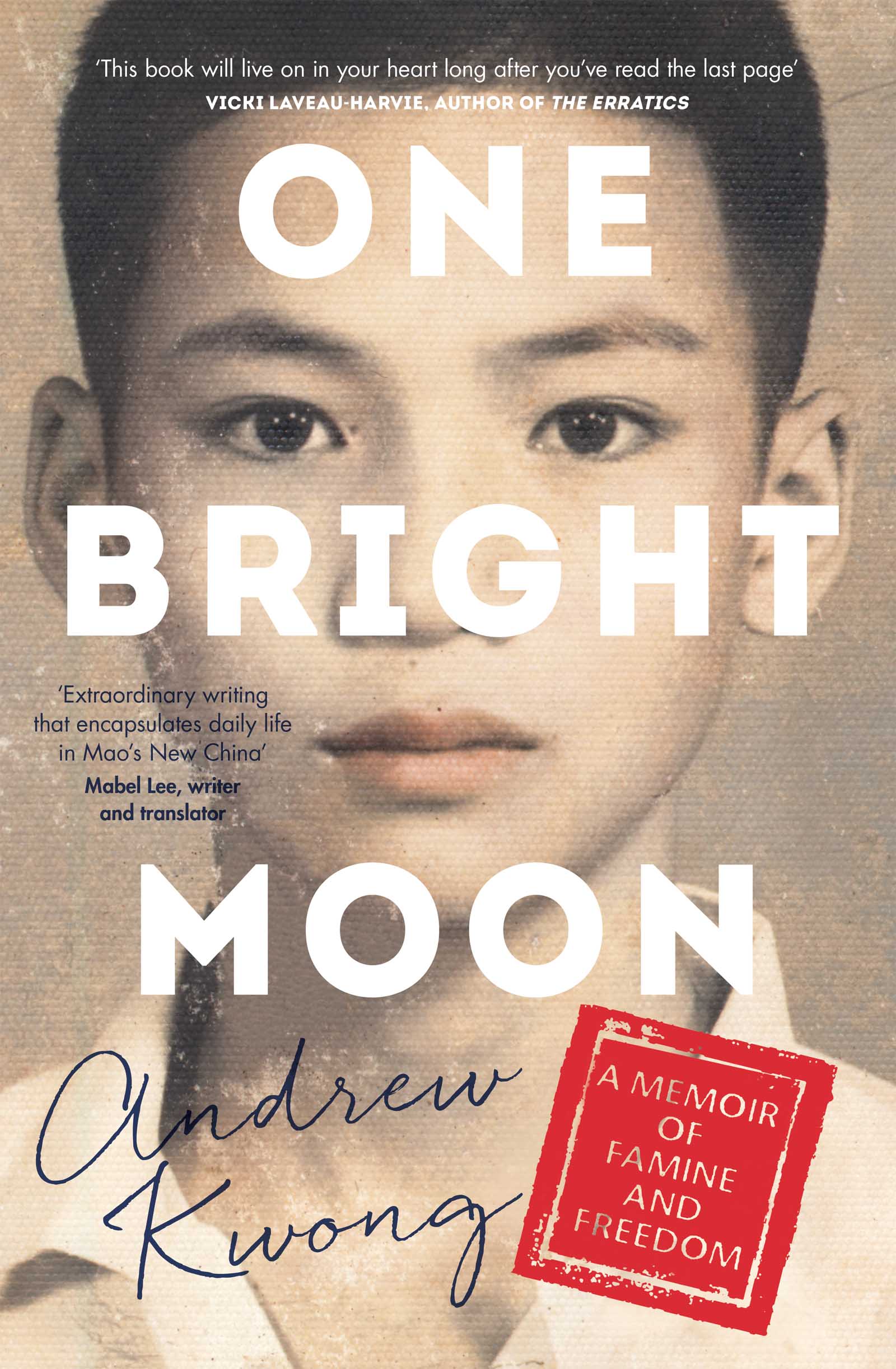
I dedicate this book, with much gratitude and love, to the memory of my Mama Wai-syn Young, and Baba Shek-tong Kwong, who endured the utmost pain as parents watching their family being torn apart, yet who, with fortitude, perseverance and amazing grace, ensured the familys final reunion.
Also, with much appreciation, to the memory of Brother Casimir, Principal of La Salle College, Kowloon, Hong Kong, who gave me the courage I needed to navigate the world.
With all my love, to my children Serena, Harmony and Andrew-James. The love of a parent is forever.
And, last but not least, to my seven little Australians: Bruno, Louis, Clementine, Charlie, Fleur, Henry and Felix. For you are the reason I wrote this book.
Classes struggle, some classes triumph,
others are eliminated.
Mao Tse-tung
CONTENTS
| 1911 | Sun Yat-sen leads overthrow of Qing dynasty |
| 1912 | Founding of the Republic of China |
| 1921 | Establishment of the Communist Party of China |
| 1927 | Beginning of Chinese Civil War between Communists and Nationalist government |
| 1928 | Chiang Kai-shek becomes leader of Nationalist government |
| 1934 | Communist forces escape Nationalist encirclement and undertake a 9000-kilometre retreat to northern China, the so-called Long March |
| 1935 | Mao Tse-tung becomes leader of the Communist Party |
| 193745 | Second Sino-Japanese War |
| 1946 | Resumption of Chinese Civil War |
| 1949 | Mao declares victory and founds the Peoples Republic of China |
| 195152 | The Three-anti and Five-anti campaigns urge Chinese people to rid themselves of bourgeois, capitalist elements |
| 195357 | First Five-Year Plan begins modernisation and industrialisation of Chinese economy |
| 1956 | Hundred Flowers Campaign encourages citizens to express their opinions of the Communist regime |
| 195759 | Anti-Rightist Campaign initiates a purge of Rightist (i.e. anti-communist) elements from society |
| 195862 | Second Five-Year Plan, or Great Leap Forward, Maos campaign to collectivise and industrialise the agrarian economy, leads to widespread famine and the deaths of millions |
| 1958 | Citizens encouraged to kill rats, mosquitoes, flies and sparrows under the Four Pests Campaign |
| 1966 | In Australia, Harold Holts government markedly reduces restrictions on non-European immigration |
| 196676 | The Cultural Revolution, aimed at further eliminating bourgeois elements from society, leads to mass persecution of intellectuals in China |
| 1967 | Pro-communist activists riot and plant bombs in Hong Kong |
| 1971 | China joins the United Nations |
| 1972 | US president Richard Nixon visits China |
| 1973 | In Australia, Gough Whitlams Labor government officially ends the White Australia policy |
| 1976 | Death of Mao Tse-tung |
| 1978 | Deng Xiaoping becomes head of Chinese government |
| 1980 | One Child Policy introduced in China |
| 1989 | Tiananmen Square Protests in Beijing lead to killing of hundreds of protestors by Chinese military; Australian prime minister Bob Hawke responds by granting asylum to 42,000 Chinese students living in Australia |
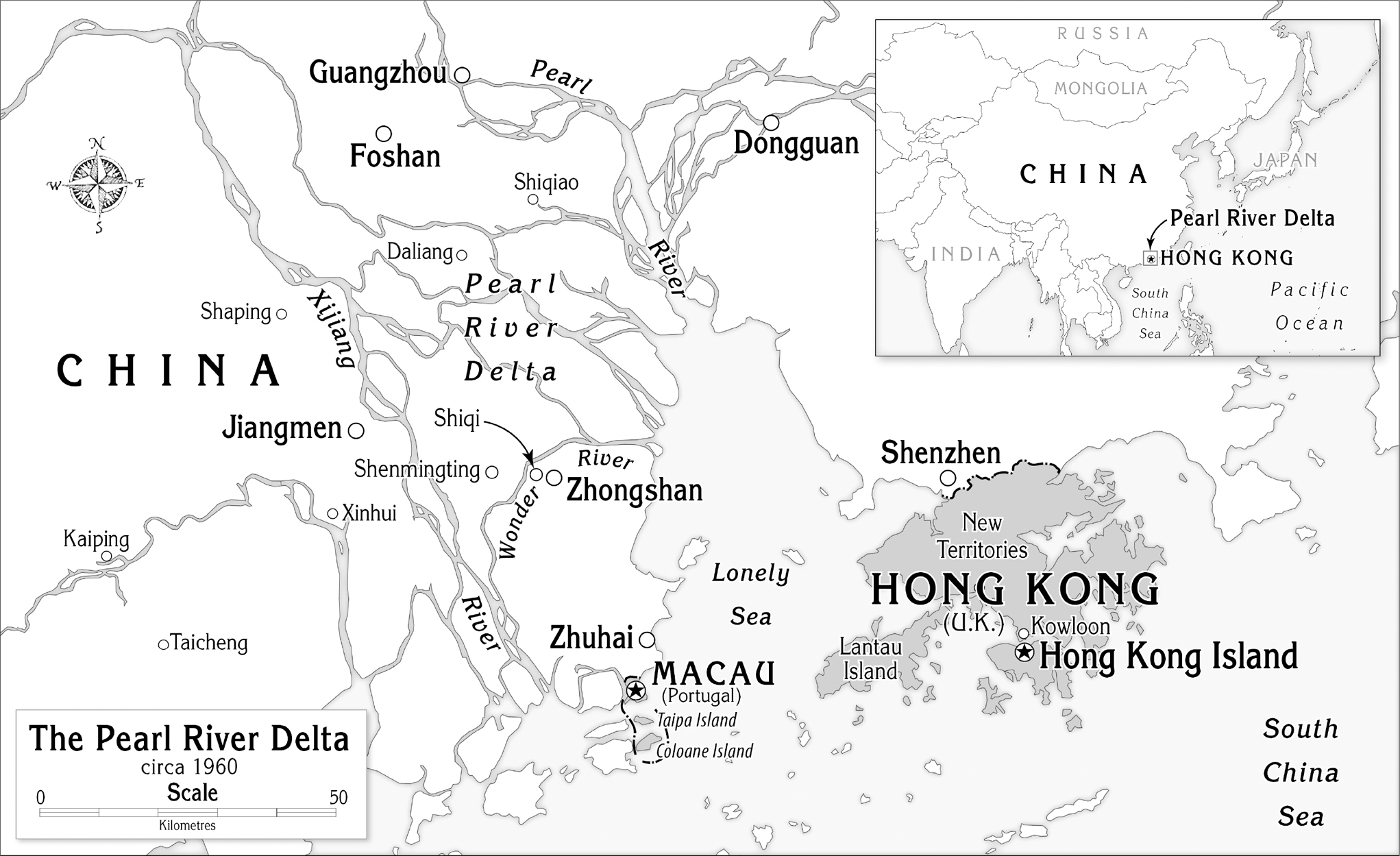
courtesy of the author
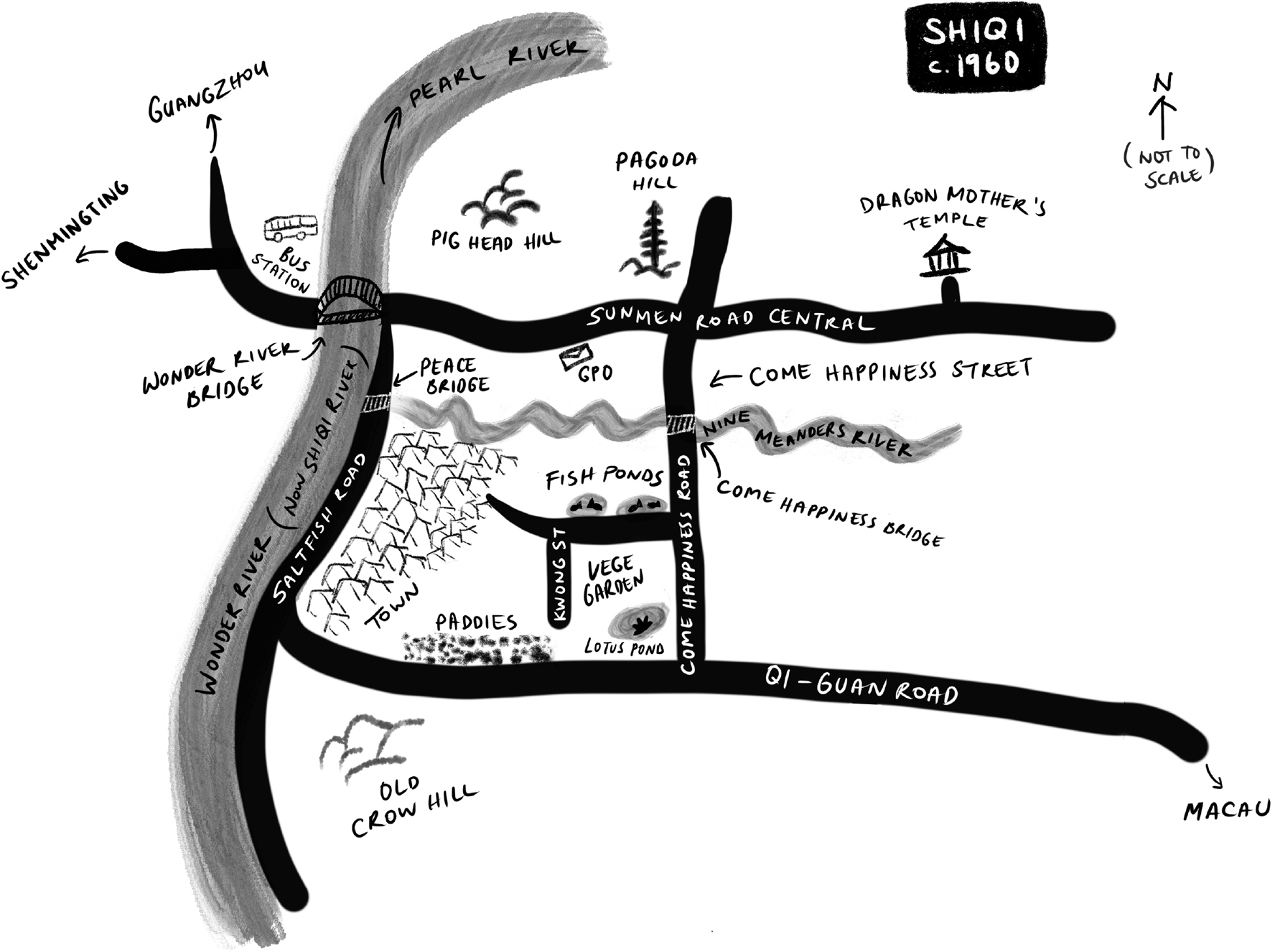
courtesy of the author
Sixteenth Day, Third Lunar Month, 1894
In Shenmingting, a small town situated in the vast estuary of the Pearl River in Guangdong, my great-grandfather Fu-chiu awaits his bride. He strolls around the large courtyard of his ancestral home where more than twenty tables stand ready to seat relatives and distinguished guests. The tables and guests spread onto his cousins front yard next door.
Both houses have been splashed with a good coat of whitewash to conceal the ageing grey bricks of the otherwise handsome homes. Days before the happy occasion, the painters had been about to brush over the decorative panels beneath the eaves of the two houses when Fu-chius father had intervened. Stop, hed shouted at them, aghast at their ignorance. Leave them alone. Those are story panels. The panels depicted many Chinese legends that had captured the imaginations of past generations and would do the same for generations to come. Hed made sure they were safe before directing other servants and helpers who were putting the final touches to the wedding preparations.
On either side of the courtyard gates and at the back of the houses, incense sticks burn and paper money has been left out as offerings to the door-gods and other supernatural guardians who, in return, it is hoped, will protect the household. The offerings are also made to repel the ghosts that are said to wander constantly seeking souls to take their place in the spirit world and free them to be reborn and reach enlightenment. First and foremost, the aim is to ensure the smooth execution of the important day.
Fu-chiu mingles with the guests and, to ease his nerves, takes deep breaths of the abundant smoke lingering in the sweet-scented spring air. He turns back to look at the panels and is pleased his father chose to keep them, even though their colours have faded under the subtropical sky. Much to his delight, they break the sterile monotony of white paint, and preserve the vivacity of the life he has known. The image of the exuberant General Guan Gong on the panel depicting events from the fourteenth-century historical novel Romance of the Three Kingdoms is his favourite. How fondly he remembers the tale told to him by his father who, in turn, had been told it by his father. Such was Guan Gongs courage and loyalty in leading the forces of Liu Ban, founder of one of the Three Kingdoms in the third century AD, that he later became not just a folk hero but a god for the Chinese people. From the panel, he seems to beam approval on the familys important day. The tension eases inside Fu-chiu.
Because he has just turned twenty, the coming of age for Chinese men, it is fitting that Fu-chiu be married. He has never met his bride-to-be; he doesnt even know her name. While he was away attending high school, the village go-between was arranging a suitable marital candidate for him under his fathers instruction. The process of choosing a wife has remained much the same since his ancestors arrived from the north. People do not marry someone from the same village in case the potential spouse is a descendant of shared forebears who fled the onslaught of the mighty Mongol armies a thousand years earlier. The expertise of the go-between is important for her intimate knowledge of the many families in the surrounding area. Gossip, hearsay, facts, half-truths and, of course, family trees all help her to assess her clients backgrounds and ensure a good fit. When the go-between enters a match-making deal, her vivid and creative imagination, coupled with a keen sense of how well partners will suit each other, is put into play to ensure success. The bride-to-be must not only be obedient, attentive and devoted, but also beautiful, virtuous and able to produce healthy children. As for the potential groom, he should, of course, be handsome, intelligent and rich, and if he is not wealthy yet, he will be one day, as predicted by her fortune-telling skills.
Font size:
Interval:
Bookmark:
Similar books «One Bright Moon»
Look at similar books to One Bright Moon. We have selected literature similar in name and meaning in the hope of providing readers with more options to find new, interesting, not yet read works.
Discussion, reviews of the book One Bright Moon and just readers' own opinions. Leave your comments, write what you think about the work, its meaning or the main characters. Specify what exactly you liked and what you didn't like, and why you think so.

